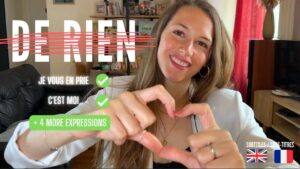Transcript of the video
For 18 years, this man lied to everyone.
He claimed to be a doctor and researcher. Unfortunately, the story had a very unhappy ending.
Welcome to another episode of Learn French with News. Today, I'm bringing you a special crime episode. I'm going to tell you the story of a crime from the 90s.
The end of this story is quite violent, so please don't be a sensitive soul. As usual, you can download the free vocabulary sheet for this video to review the words and vocabulary from the lesson. Just click on the link in the video description.
The story I'm going to tell you today is that of Jean-Claude Romand.
The Jean-Claude Romand case is a major criminal affair in France.
This case, this news item, is very well known in France. A "fait divers" is a section of the media where tragic events, such as accidents or crimes, are reported. These are all events that don't fit into the classic headings such as politics, business, culture or sport.
Let me start by telling you a little of this man's story.
Jean-Claude Romand was born in 1954 in a town in the Jura region. Jura is a department in eastern France. His father was a farmer and his mother a housewife. Jean-Claude Romand is an only child. This means he has no brothers and no sisters.
At school, Jean-Claude Romand was a very good student. He worked hard and got good grades. He was studious. In fact, he passed his baccalauréat a year early in 1971. He went on to study medicine in Lyon.
He wants to become a doctor. Unfortunately, he doesn't pass his second year of medical school. He fails. And that's when everything changes. This is a very important moment in the story. It's where his life takes a turn. Jean-Claude Romand would have his family and friends believe that he had passed his second year of medical school.
And above all, he tells them that he's been very successful, with very good marks in all subsequent years. He attends classes. On exam day, he goes to the hall, but obviously doesn't take the exams.
All this, of course, until he graduated as a doctor. At least, that's what he tells his friends and family. Of course, as you can see, it's a lie.
His whole life is a deception. It's all a lie. In fact, between 1976 and 1986, he re-enrolled every year in his second year of medical school.
During his studies, he became close to his cousin by marriage. This means there's no blood link between them. She entered his family through marriage. He becomes close to this cousin by marriage, Florence, and begins a relationship with her. They're in love. This woman is a pharmacist.
She works in a pharmacy. It's where you can buy medicines. They marry in 1980 and have two children, a boy and a girl, Caroline and Antoine. Together, they live in a town near Geneva, close to the Swiss border.
In the years that followed his graduation as a doctor, in the years that followed, Jean-Claude Romand became bogged down in his lies. He will sink into his lies.
He's supposed to be a doctor. So he's going to tell his wife, his parents and his family that he's been hired at the WHO in Geneva, Switzerland.
WHO stands for World Health Organization. He says he's a doctor and a researcher for this organization. But the reality is quite different. This expression, "the reality is quite different" means that what happens in real life isn't like that at all. In reality, he spends his day in freeway service areas, in the library...
He even pretends he's going to international congresses in Japan and the USA. All the while, Jean-Claude Romand continues to take an interest in medicine, and during all those hours in the library or on freeway rest areas, he reads books and accumulates a wealth of knowledge.
He would have been able to have conversations on highly specialized medical topics. As you can see, Jean-Claude Romand didn't actually have a job. But what did he live on? How did he make his money?
In reality, he was borrowing money from different people. And in fact, what he's doing is borrowing money from other people to pay off the debts he owes.
So people continue to lend him money as he repays by borrowing from others. He'll also do little scams, little cons.
For example, he'll sell fake drugs that cure cancer. He'll also suggest to his friends and family that they invest their money in Switzerland to make it grow, to earn more money. And of course, he won't invest any of this money at all, he'll keep it for himself.
So it's thanks to all these little scams, these little swindles, that he'll get money and make people believe he has a salary.
Quite simply.
But at some point in the early '90s, it became too much. He's told too many lies, he's borrowed too much money and he doesn't know how to get out of it.
He really feels that his lies are going to be uncovered, that the truth is going to come out. He's been lying to everyone for almost 20 years.
His family and friends start asking questions. For example, his wife doesn't understand why she can't call him directly on his office phone at WHO.
A family acquaintance who works at WHO says he's never heard of him and he's not on the employee list. He also has a debt.
He's borrowed around €200,000 from his former mistress, Chantal, who's demanding he pay it back. He's cornered. He feels trapped. He doesn't know what to do.
So he's going to commit the irreparable. Commettre l'irréparable is a French expression meaning to do something with catastrophic consequences. We're going to do something and there's no turning back.
We're doing something extremely serious. To put it in context, he was 38 at the time. The year was 1993. On a Saturday morning in January, he kills five people.
First, he will kill his wife and two children in their home. He's going to murder his wife. Murder means to kill, to commit murder. While she's sleeping, in her sleep with a rolling pin, so he's going to hit her with a rolling pin and he's going to kill her.
Then he's going to kill his two children with a rifle. He shot them. He had fitted his gun with a silencer. A silencer is something you put on a gun to camouflage it, to reduce the noise of the shot.
Then, and this is very strange, he'll behave as if everything were normal. He'll tidy up his house. He'll pick up his mail from his mailbox, so he'll pick up his mail.
Then he goes downtown, buys some newspapers and reads them quietly. On the same day, he then goes to his parents' house for lunch.
As you may have guessed, he's also going to kill them with his rifle. He's also going to kill their dog. But Jean-Claude Romand's day doesn't end there. He will then take a car and drive to Paris, where his former mistress, Chantal, lives.
Let me remind you that Jean-Claude Romand has invented a whole life for himself, so he makes his mistress believe he's taking her to dinner at Bernard Kouchner's house.
Maybe that name rings a bell, because he's a public figure. He's a well-known, famous person, especially at the time. At the time, Bernard Kouchner was Minister of Health. He was also known as a humanitarian activist.
He was involved in the creation of Médecins Sans Frontières and Médecins du Monde. Of course, as you can imagine, he doesn't know him at all. They're not friends. On the way, he pretends to get lost and stops in a forest.
There, he tries to murder Chantal, his former mistress, with tear gas.
Tear gas stings the eyes and makes smoke. And he'll try to strangle her. Strangling is when you squeeze someone's throat to prevent them from breathing.
Chantal will beg him to stop, and he will. He won't kill her. So he spares Chantal. Sparing someone is when you intend to hurt someone, but in the end, you give up and don't do it.
He's going to take her home and make her promise, make her swear not to say anything. He explains to her that he has a brain tumor, a disease of the brain, and that this disease, this tumor, alters, modifies his behavior, that he's not himself and that's why he made this inappropriate gesture.
I remind you, this is still the same Saturday on which he killed his wife, children and parents. He then goes back to his house and pours gasoline all over it. And he's also going to pour petrol over the bodies of his wife and children.
He'll get into his pyjamas and swallow some barbiturates. The word barbiturate is hardly ever used today, as it's the ancestor of sleeping pills.
Sleeping pills are medicines taken to help you sleep. People with insomnia, who can't sleep at night, generally take them.
So he takes barbiturates, but they're 10 years out of date. He then sets the house on fire. The fire starts just as the garbage collectors are picking up the trash.
Garbage collectors are the people who collect people's rubbish. They quickly alert the fire department, who intervene to save Jean-Claude Romand. They find Romand unconscious, but alive.
He was then taken to hospital in Geneva. In his car, the police will find a note that reads "A banal accident and an injustice can cause madness. I'm sorry."
Banal means common, not exceptional. And injustice is when something shouldn't have happened, it's not fair.
Understandably, he took his failure at medical school as a real injustice. Insanity is when you're crazy, when you do things that don't make sense.
It's the investigation that will reveal the whole deception, the whole life that Jean-Claude Romand has invented for himself. We discover that he has completely lied about his life, and that the way his friends and family describe him is not at all the reality.
Before we talk about the trial, let's go back five years to 1988. At that time, he had borrowed money from his father-in-law, his wife's father.
A few days after his father-in-law asked him to reimburse him, he died by accident, falling down the stairs. And the only witness to this accident was Jean-Claude Romand.
Today, of course, the accidental nature of this event is somewhat questionable. But at the time, five years before Jean-Claude Romand's murder, an investigation was carried out and the conclusion was that it was indeed an accident.
We believed Jean-Claude Romand at the time. The Romand trial took place in 1996 for the murder of his wife, his two children and his parents. He didn't really explain why he had lied all those years. He didn't explain his motives.
On the other hand, he explained the murders, his act, by the fear of disappointing his family. According to him, he was so afraid of disappointing his family, he couldn't face up to his lies. It was too painful for him to tell the truth. He preferred to kill everyone.
In his trial, he even said... " If I killed my wife, it was because of the intolerable pain she would experience when she understood my lies." The psychiatrists who attended the trial described Jean-Claude Romand as a mythomaniac.
A mythomaniac is someone who has a disease, and that disease is telling lies all the time. Jean-Claude Romand will be sentenced to life imprisonment. Ecoper means to receive. Generally speaking, it's used to refer to a punishment received. Écoper d'une peine de prison.
There's an interesting word here, "perpetuity". Normally, this word is very simple: it means "for life". But in the vocabulary of justice in France, perpetuity is not for life. Perpetuity is equal to a 30-year prison sentence.
After 26 years in prison, Jean-Claude Romand will be released in June 2019. The courts have accepted his conditional release.
This means that he hasn't finished his prison sentence, but he's entitled to get out, for example, because he behaved well in prison.
This is the early release, in advance, of someone before they have finished serving their sentence. The prisoner is free, but must of course comply with certain conditions.
In Jean-Claude Romand's case, he was wearing an electronic bracelet. This allows us to see where he is. During his probation period, which is the period during which he is not 100% free, he was housed by monks in an abbey. He was housed for two years, until 2021, and today he's free.
And so the story of Jean-Claude Romand comes to an end. If you're interested, there's also a film called "L'adversaire" starring Daniel Auteuil, a very famous actor in France, who plays the character of Jean-Claude Romand.
I suggest you watch it if you're interested.
It's called "L'adversaire". If you liked this video, put a like or leave me a little comment to support my work.
Don't forget, you can download the vocabulary sheet to review all those words we saw today by clicking on the link in the description.
See you soon for another French video.







